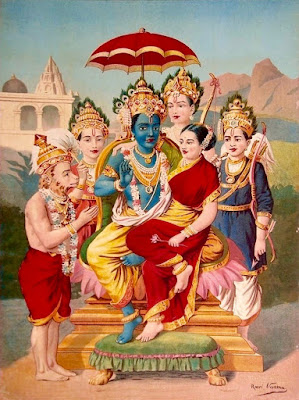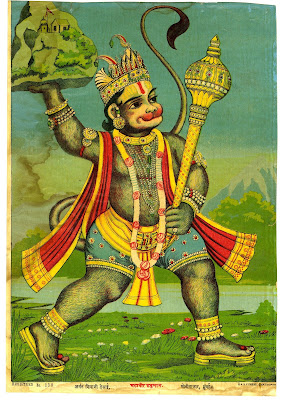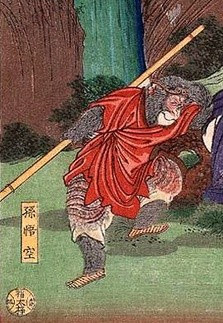Reading Notes : Narayan Ramayana, Reading A
(Image of Rama with his wife Sita, Hanuman, and Rama's brothers. Source. Wikipedia)
The Prologue
- The story is very vivid. All the environment and events are described in good detail.
- Vishnu decided to reincarnate as a son of the King Dasaratha to kill Ravana and his brothers. Sounds like a very common origin story, but always fun to read
- Its interesting that Vishnu decided to born in a monkey clan, since Ravana was destined to be killed by a monkey.
- Whole full year of sacrifice sounds very grim. But aftermath of this ritual was Rama and his brothers birth
Rama's Initiation
- Very interesting to read about Viswamithra here since I wrote a blog about him
- The part where Viswamithra asks Rama to accompany him on a ritual was very interesting since it got me thinking master/student relationship in the future.
- Did not realized this chapter was broken into smaller story sections. This can help readers to delve deeper into Indian myths and also help explaining background stories.
- Rama's first battle with Thataka was very intense due to the descriptive tone that the writer uses. Demoness is described as having carvernous mouth, fiery eyes, and brows twitching in rage.
- Another scene where Vishwamithra performs yagna was interesting read too since the asuras(demons) comes to stop them and Rama and Lakshmana fights them off,
- It was funny how the most powerful god, Indra, was cursed by an sage
The Wedding
- Scene where Rama and Sita falls in love is very romantic as she was sitting in a balcony and he was looking up to her. kind of like Romeo and Juliet.
- When Rama manages to obtain the bow of shiva, I think that scene is where he is shown as like a hero. Just as when King Arthur pulled the excalibur out of the rock.
Two Promises Revived
- Coronation part was very interesting and fun to me since the family drama is always fun.
- The title explains the story of this chapter very well since he had to grant Kaikeyi's wishes and King Dasaratha's curse is coming true.
Bibliography: R.K Narayan, The Ramayana




Comments
Post a Comment